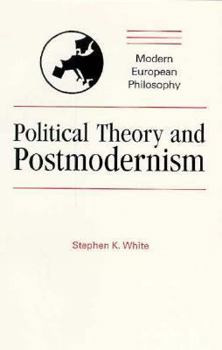Political Theory and Postmodernism
Postmodernism has evoked great controversy and it continues to do so today, as it disseminates into general discourse. Some see its principles, such as its fundamental resistance to metanarratives, as frighteningly disruptive, while a growing number are reaping the benefits of its innovative perspective. In Political Theory and Postmodernism, Stephen K. White outlines a path through the postmodern problematic by distinguishing two distinct ways of thinking about the meaning of responsibility, one prevalent in modern and the other in postmodern perspectives. Using this as a guide, White explores the work of Heidegger, Foucault, Derrida, Lyotard, and Habermas, as well as 'difference' feminists, with the goal of showing how postmodernism can inform contemporary ethical-political reflection. In his concluding chapter, White examines how this revisioned postmodern perspective might bear on our thinking about justice.
Format:Paperback
Language:English
ISBN:0521409489
ISBN13:9780521409483
Release Date:August 1991
Publisher:Cambridge University Press
Length:172 Pages
Weight:0.50 lbs.
Dimensions:0.6" x 5.5" x 8.5"
Customer Reviews
1 rating
An accessible work on postmodern political theory
Published by Thriftbooks.com User , 17 years ago
This is an interesting (albeit challenging) volume. To define postmodernism in a few sentences is pretty tough, but here's one shot at it, so that readers not familiar with this theoretical perspective have some sense of the view: Among characteristics of this perspective (and different Postmodern thinkers will not accept all): skepticism about the ability of science, technology, or philosophy to act as guides for us; doubts about the ability of the subject (humans) to be able to understand objects (the world) accurately--in fact, the separation of subject and object is looked at as mistaken; a concomitant uncertainty about human rationality; in the end, suspicion of efforts to create grand theories that try to explain the human condition; anti-foundationalism (meaning that there is no solid foundation upon which humans can develop true understandings of the world around them); a post-structuralist perspective on language (which I won't even try to explain here). Postmodernists challenge all-encompassing worldviews or philosophical perspectives (such as Marxism, Christianity, liberal democracy, capitalism, or modern science, inter alia), sometimes referred to as "metanarratives." Sorry for all this introductory stuff. The book itself tries to revitalize the concept of "justice." The author, Stephen White, tries to meld postmodern sensibilities with the prevalent modern orientation to understanding. He believes that the tension between the two can provide for a dynamic and enriched view of justice. To try to pull this off, various chapters of the book examine the modern-postmodern tension/debate, Martin Heidegger's contributions to the debate and to speculating on the concept of justice, Jacques Derrida's brand of postmodernism and its relevance for justice, and radical feminists' views as these inform the discussion. The last part of the work tries to pull these strands together to provide a useful contribution to our understanding of justice. Is he successful? I leave that to readers who make the effort to grapple with this challenging work. While I am not so sure that his final analysis is fully convincing, his effort is itself a contribution, since one starts thinking more deeply about the nature of justice and how very different perspectives might illuminate that concept better.





